Organizational Behavior: Attitude Impact on Individuals, Groups
VerifiedAdded on 2019/11/26
|9
|2187
|210
Essay
AI Summary
This essay delves into the critical importance of attitude in shaping behavior at individual, group, and organizational levels within the realm of organizational behavior. It emphasizes the impact of individual attitudes on job satisfaction, communication, and overall performance, highlighting the role of leadership styles in fostering employee motivation and engagement. The essay explores how group dynamics, including discussions and collaboration, influence knowledge sharing and decision-making processes. Furthermore, it examines the significance of organizational culture, ethical practices, and employee commitment in maintaining positive organizational behavior. The study also addresses the implementation of reward and recognition policies to enhance employee motivation and overall organizational effectiveness. The essay draws on the views of various scholars to analyze the interconnectedness of attitude and behavior in achieving business success.
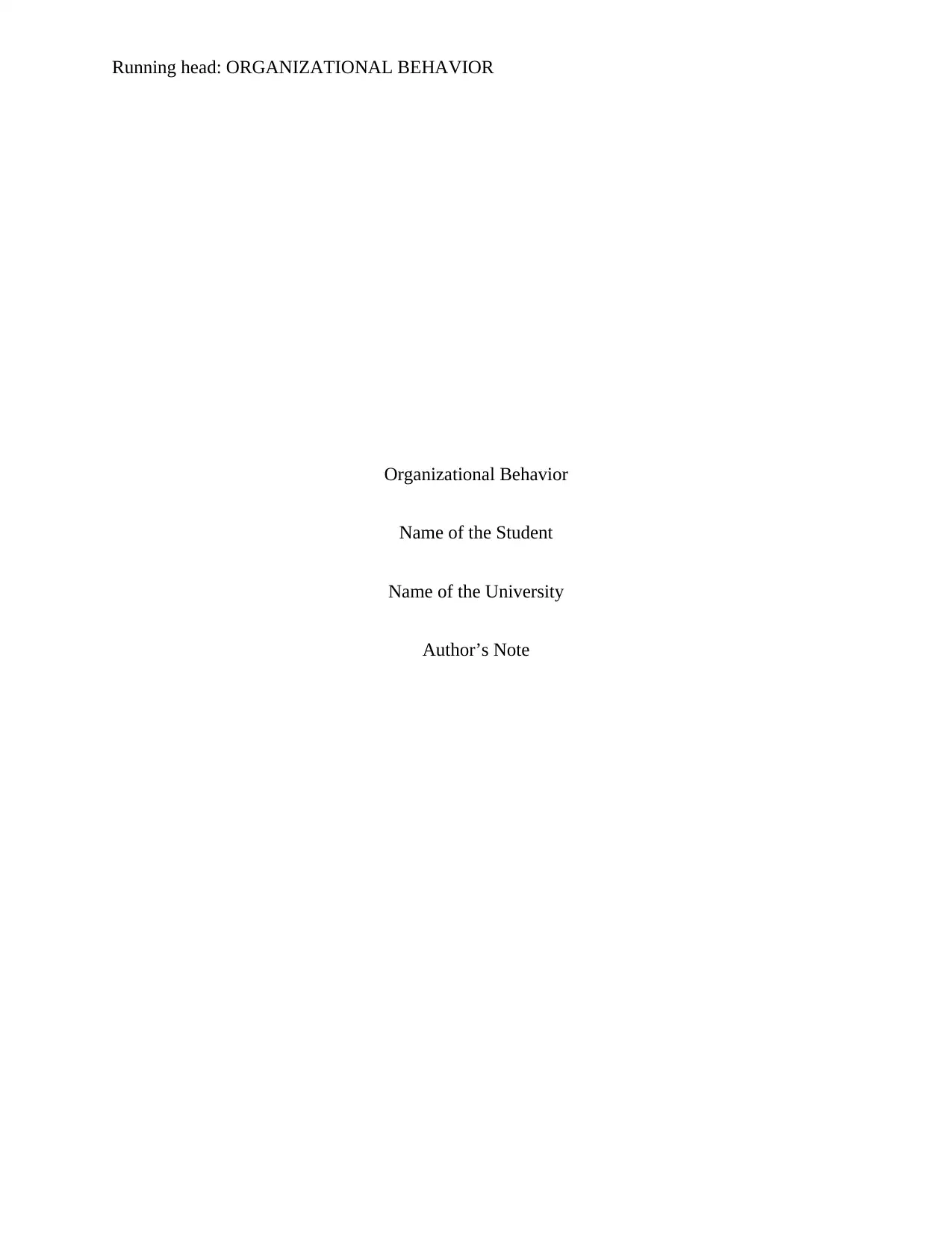
Running head: ORGANIZATIONAL BEHAVIOR
Organizational Behavior
Name of the Student
Name of the University
Author’s Note
Organizational Behavior
Name of the Student
Name of the University
Author’s Note
Paraphrase This Document
Need a fresh take? Get an instant paraphrase of this document with our AI Paraphraser
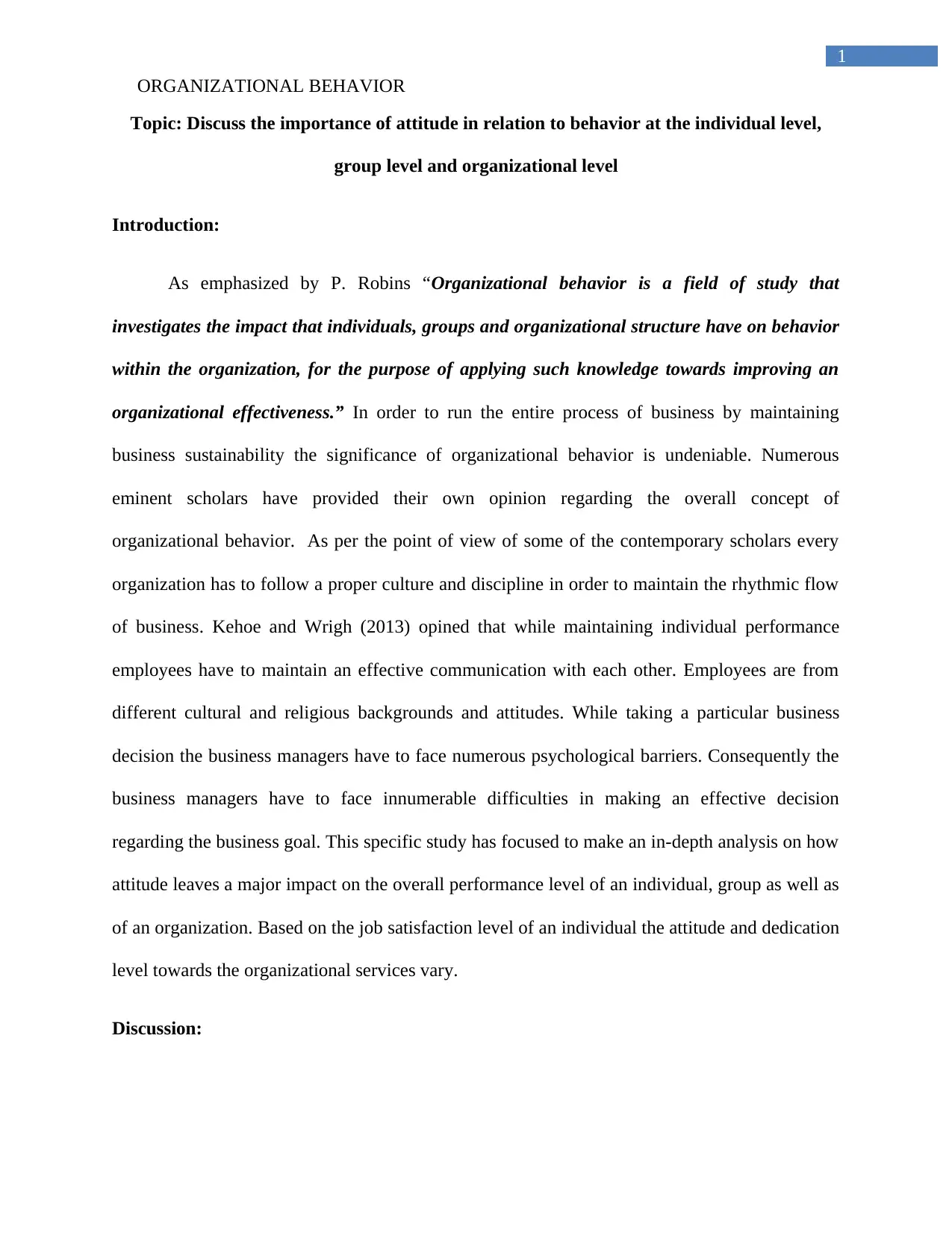
1
ORGANIZATIONAL BEHAVIOR
Topic: Discuss the importance of attitude in relation to behavior at the individual level,
group level and organizational level
Introduction:
As emphasized by P. Robins “Organizational behavior is a field of study that
investigates the impact that individuals, groups and organizational structure have on behavior
within the organization, for the purpose of applying such knowledge towards improving an
organizational effectiveness.” In order to run the entire process of business by maintaining
business sustainability the significance of organizational behavior is undeniable. Numerous
eminent scholars have provided their own opinion regarding the overall concept of
organizational behavior. As per the point of view of some of the contemporary scholars every
organization has to follow a proper culture and discipline in order to maintain the rhythmic flow
of business. Kehoe and Wrigh (2013) opined that while maintaining individual performance
employees have to maintain an effective communication with each other. Employees are from
different cultural and religious backgrounds and attitudes. While taking a particular business
decision the business managers have to face numerous psychological barriers. Consequently the
business managers have to face innumerable difficulties in making an effective decision
regarding the business goal. This specific study has focused to make an in-depth analysis on how
attitude leaves a major impact on the overall performance level of an individual, group as well as
of an organization. Based on the job satisfaction level of an individual the attitude and dedication
level towards the organizational services vary.
Discussion:
ORGANIZATIONAL BEHAVIOR
Topic: Discuss the importance of attitude in relation to behavior at the individual level,
group level and organizational level
Introduction:
As emphasized by P. Robins “Organizational behavior is a field of study that
investigates the impact that individuals, groups and organizational structure have on behavior
within the organization, for the purpose of applying such knowledge towards improving an
organizational effectiveness.” In order to run the entire process of business by maintaining
business sustainability the significance of organizational behavior is undeniable. Numerous
eminent scholars have provided their own opinion regarding the overall concept of
organizational behavior. As per the point of view of some of the contemporary scholars every
organization has to follow a proper culture and discipline in order to maintain the rhythmic flow
of business. Kehoe and Wrigh (2013) opined that while maintaining individual performance
employees have to maintain an effective communication with each other. Employees are from
different cultural and religious backgrounds and attitudes. While taking a particular business
decision the business managers have to face numerous psychological barriers. Consequently the
business managers have to face innumerable difficulties in making an effective decision
regarding the business goal. This specific study has focused to make an in-depth analysis on how
attitude leaves a major impact on the overall performance level of an individual, group as well as
of an organization. Based on the job satisfaction level of an individual the attitude and dedication
level towards the organizational services vary.
Discussion:
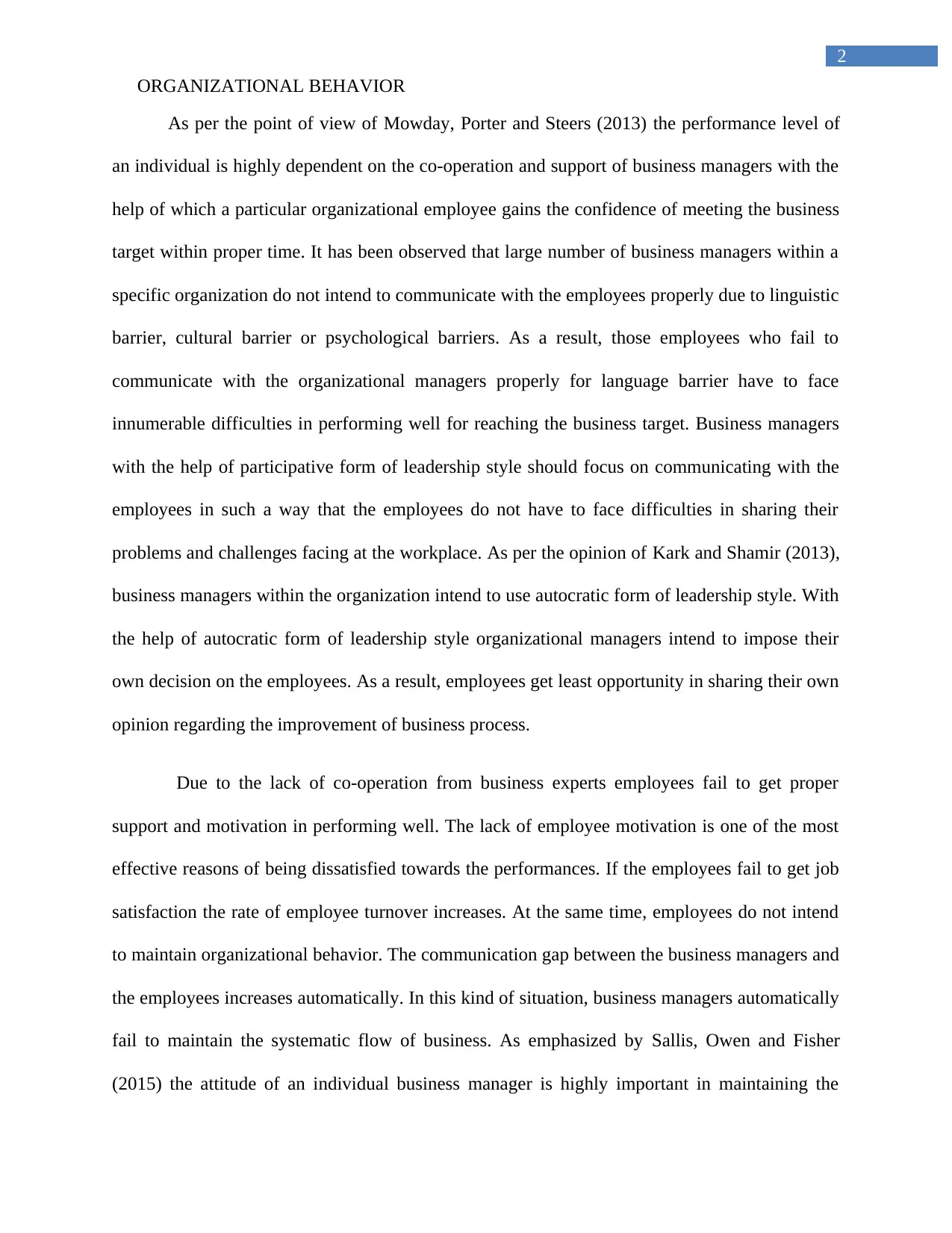
2
ORGANIZATIONAL BEHAVIOR
As per the point of view of Mowday, Porter and Steers (2013) the performance level of
an individual is highly dependent on the co-operation and support of business managers with the
help of which a particular organizational employee gains the confidence of meeting the business
target within proper time. It has been observed that large number of business managers within a
specific organization do not intend to communicate with the employees properly due to linguistic
barrier, cultural barrier or psychological barriers. As a result, those employees who fail to
communicate with the organizational managers properly for language barrier have to face
innumerable difficulties in performing well for reaching the business target. Business managers
with the help of participative form of leadership style should focus on communicating with the
employees in such a way that the employees do not have to face difficulties in sharing their
problems and challenges facing at the workplace. As per the opinion of Kark and Shamir (2013),
business managers within the organization intend to use autocratic form of leadership style. With
the help of autocratic form of leadership style organizational managers intend to impose their
own decision on the employees. As a result, employees get least opportunity in sharing their own
opinion regarding the improvement of business process.
Due to the lack of co-operation from business experts employees fail to get proper
support and motivation in performing well. The lack of employee motivation is one of the most
effective reasons of being dissatisfied towards the performances. If the employees fail to get job
satisfaction the rate of employee turnover increases. At the same time, employees do not intend
to maintain organizational behavior. The communication gap between the business managers and
the employees increases automatically. In this kind of situation, business managers automatically
fail to maintain the systematic flow of business. As emphasized by Sallis, Owen and Fisher
(2015) the attitude of an individual business manager is highly important in maintaining the
ORGANIZATIONAL BEHAVIOR
As per the point of view of Mowday, Porter and Steers (2013) the performance level of
an individual is highly dependent on the co-operation and support of business managers with the
help of which a particular organizational employee gains the confidence of meeting the business
target within proper time. It has been observed that large number of business managers within a
specific organization do not intend to communicate with the employees properly due to linguistic
barrier, cultural barrier or psychological barriers. As a result, those employees who fail to
communicate with the organizational managers properly for language barrier have to face
innumerable difficulties in performing well for reaching the business target. Business managers
with the help of participative form of leadership style should focus on communicating with the
employees in such a way that the employees do not have to face difficulties in sharing their
problems and challenges facing at the workplace. As per the opinion of Kark and Shamir (2013),
business managers within the organization intend to use autocratic form of leadership style. With
the help of autocratic form of leadership style organizational managers intend to impose their
own decision on the employees. As a result, employees get least opportunity in sharing their own
opinion regarding the improvement of business process.
Due to the lack of co-operation from business experts employees fail to get proper
support and motivation in performing well. The lack of employee motivation is one of the most
effective reasons of being dissatisfied towards the performances. If the employees fail to get job
satisfaction the rate of employee turnover increases. At the same time, employees do not intend
to maintain organizational behavior. The communication gap between the business managers and
the employees increases automatically. In this kind of situation, business managers automatically
fail to maintain the systematic flow of business. As emphasized by Sallis, Owen and Fisher
(2015) the attitude of an individual business manager is highly important in maintaining the
⊘ This is a preview!⊘
Do you want full access?
Subscribe today to unlock all pages.

Trusted by 1+ million students worldwide
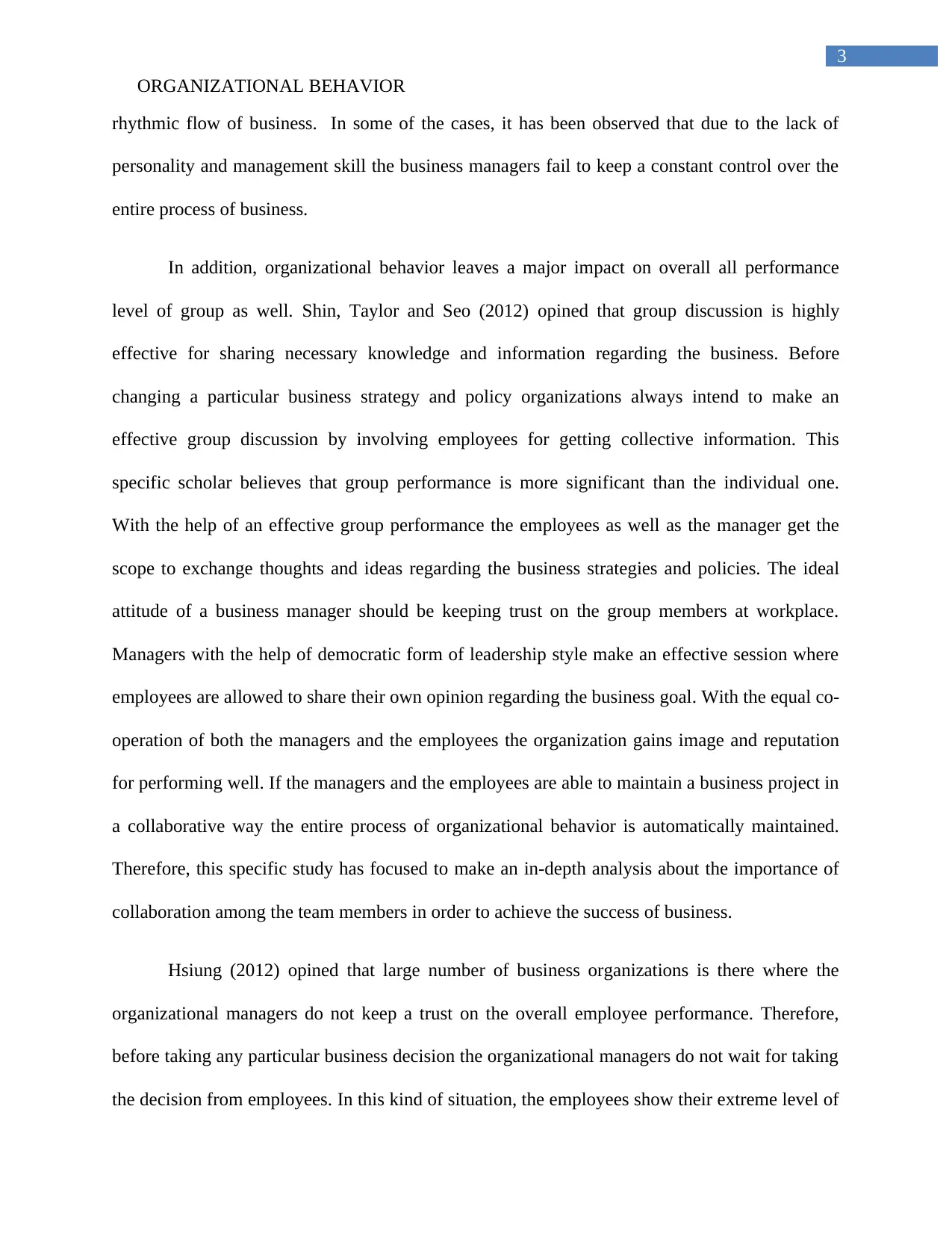
3
ORGANIZATIONAL BEHAVIOR
rhythmic flow of business. In some of the cases, it has been observed that due to the lack of
personality and management skill the business managers fail to keep a constant control over the
entire process of business.
In addition, organizational behavior leaves a major impact on overall all performance
level of group as well. Shin, Taylor and Seo (2012) opined that group discussion is highly
effective for sharing necessary knowledge and information regarding the business. Before
changing a particular business strategy and policy organizations always intend to make an
effective group discussion by involving employees for getting collective information. This
specific scholar believes that group performance is more significant than the individual one.
With the help of an effective group performance the employees as well as the manager get the
scope to exchange thoughts and ideas regarding the business strategies and policies. The ideal
attitude of a business manager should be keeping trust on the group members at workplace.
Managers with the help of democratic form of leadership style make an effective session where
employees are allowed to share their own opinion regarding the business goal. With the equal co-
operation of both the managers and the employees the organization gains image and reputation
for performing well. If the managers and the employees are able to maintain a business project in
a collaborative way the entire process of organizational behavior is automatically maintained.
Therefore, this specific study has focused to make an in-depth analysis about the importance of
collaboration among the team members in order to achieve the success of business.
Hsiung (2012) opined that large number of business organizations is there where the
organizational managers do not keep a trust on the overall employee performance. Therefore,
before taking any particular business decision the organizational managers do not wait for taking
the decision from employees. In this kind of situation, the employees show their extreme level of
ORGANIZATIONAL BEHAVIOR
rhythmic flow of business. In some of the cases, it has been observed that due to the lack of
personality and management skill the business managers fail to keep a constant control over the
entire process of business.
In addition, organizational behavior leaves a major impact on overall all performance
level of group as well. Shin, Taylor and Seo (2012) opined that group discussion is highly
effective for sharing necessary knowledge and information regarding the business. Before
changing a particular business strategy and policy organizations always intend to make an
effective group discussion by involving employees for getting collective information. This
specific scholar believes that group performance is more significant than the individual one.
With the help of an effective group performance the employees as well as the manager get the
scope to exchange thoughts and ideas regarding the business strategies and policies. The ideal
attitude of a business manager should be keeping trust on the group members at workplace.
Managers with the help of democratic form of leadership style make an effective session where
employees are allowed to share their own opinion regarding the business goal. With the equal co-
operation of both the managers and the employees the organization gains image and reputation
for performing well. If the managers and the employees are able to maintain a business project in
a collaborative way the entire process of organizational behavior is automatically maintained.
Therefore, this specific study has focused to make an in-depth analysis about the importance of
collaboration among the team members in order to achieve the success of business.
Hsiung (2012) opined that large number of business organizations is there where the
organizational managers do not keep a trust on the overall employee performance. Therefore,
before taking any particular business decision the organizational managers do not wait for taking
the decision from employees. In this kind of situation, the employees show their extreme level of
Paraphrase This Document
Need a fresh take? Get an instant paraphrase of this document with our AI Paraphraser
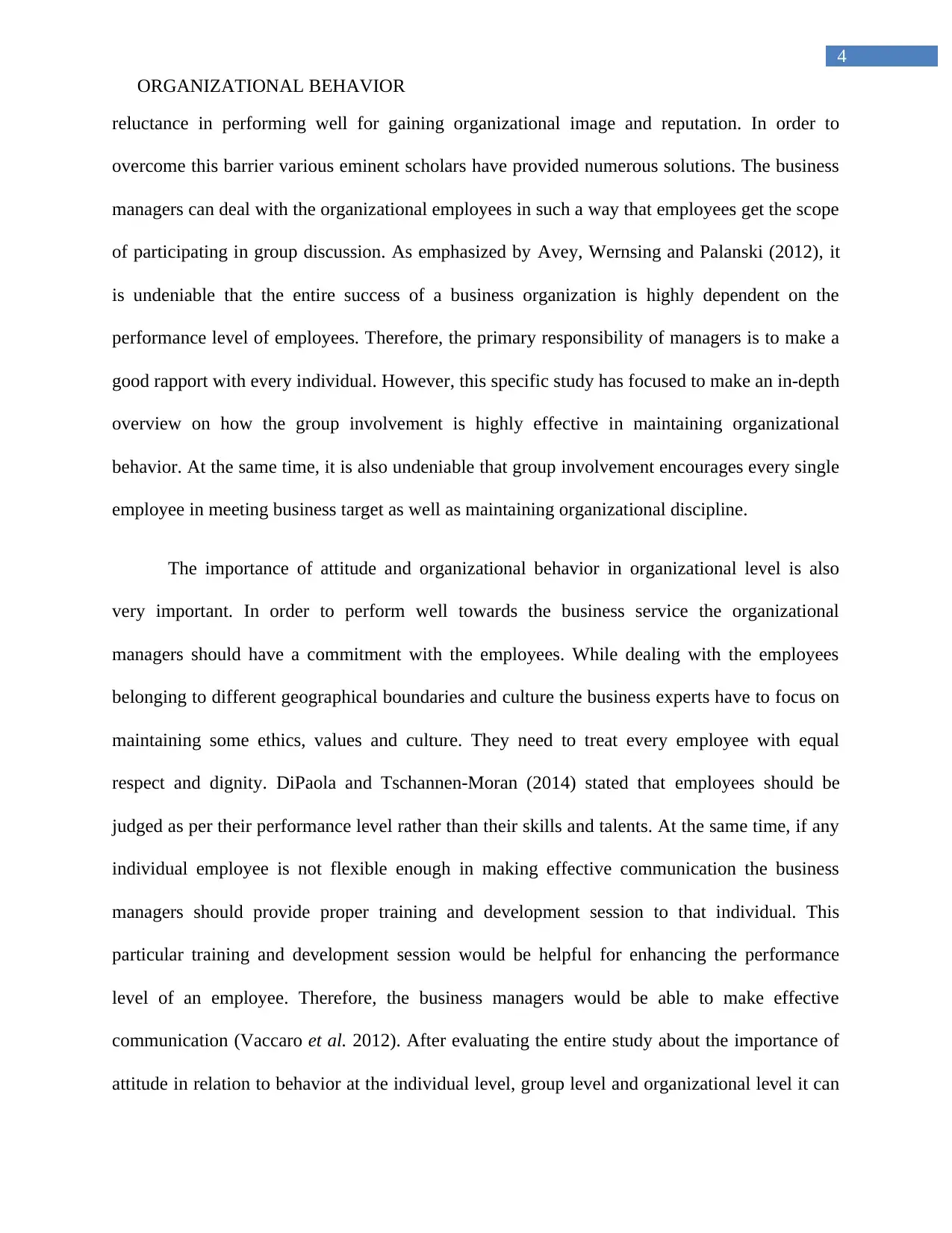
4
ORGANIZATIONAL BEHAVIOR
reluctance in performing well for gaining organizational image and reputation. In order to
overcome this barrier various eminent scholars have provided numerous solutions. The business
managers can deal with the organizational employees in such a way that employees get the scope
of participating in group discussion. As emphasized by Avey, Wernsing and Palanski (2012), it
is undeniable that the entire success of a business organization is highly dependent on the
performance level of employees. Therefore, the primary responsibility of managers is to make a
good rapport with every individual. However, this specific study has focused to make an in-depth
overview on how the group involvement is highly effective in maintaining organizational
behavior. At the same time, it is also undeniable that group involvement encourages every single
employee in meeting business target as well as maintaining organizational discipline.
The importance of attitude and organizational behavior in organizational level is also
very important. In order to perform well towards the business service the organizational
managers should have a commitment with the employees. While dealing with the employees
belonging to different geographical boundaries and culture the business experts have to focus on
maintaining some ethics, values and culture. They need to treat every employee with equal
respect and dignity. DiPaola and Tschannen-Moran (2014) stated that employees should be
judged as per their performance level rather than their skills and talents. At the same time, if any
individual employee is not flexible enough in making effective communication the business
managers should provide proper training and development session to that individual. This
particular training and development session would be helpful for enhancing the performance
level of an employee. Therefore, the business managers would be able to make effective
communication (Vaccaro et al. 2012). After evaluating the entire study about the importance of
attitude in relation to behavior at the individual level, group level and organizational level it can
ORGANIZATIONAL BEHAVIOR
reluctance in performing well for gaining organizational image and reputation. In order to
overcome this barrier various eminent scholars have provided numerous solutions. The business
managers can deal with the organizational employees in such a way that employees get the scope
of participating in group discussion. As emphasized by Avey, Wernsing and Palanski (2012), it
is undeniable that the entire success of a business organization is highly dependent on the
performance level of employees. Therefore, the primary responsibility of managers is to make a
good rapport with every individual. However, this specific study has focused to make an in-depth
overview on how the group involvement is highly effective in maintaining organizational
behavior. At the same time, it is also undeniable that group involvement encourages every single
employee in meeting business target as well as maintaining organizational discipline.
The importance of attitude and organizational behavior in organizational level is also
very important. In order to perform well towards the business service the organizational
managers should have a commitment with the employees. While dealing with the employees
belonging to different geographical boundaries and culture the business experts have to focus on
maintaining some ethics, values and culture. They need to treat every employee with equal
respect and dignity. DiPaola and Tschannen-Moran (2014) stated that employees should be
judged as per their performance level rather than their skills and talents. At the same time, if any
individual employee is not flexible enough in making effective communication the business
managers should provide proper training and development session to that individual. This
particular training and development session would be helpful for enhancing the performance
level of an employee. Therefore, the business managers would be able to make effective
communication (Vaccaro et al. 2012). After evaluating the entire study about the importance of
attitude in relation to behavior at the individual level, group level and organizational level it can
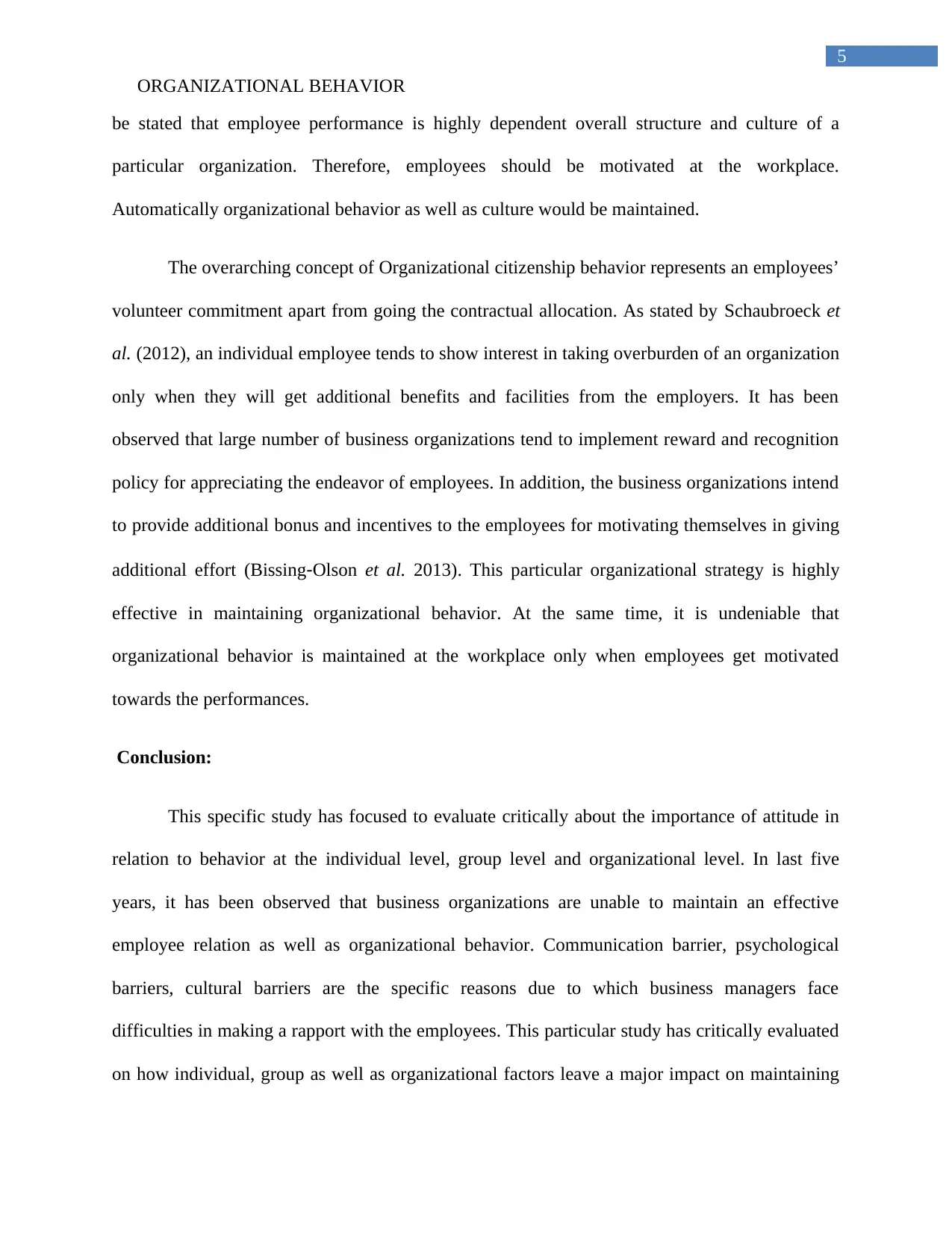
5
ORGANIZATIONAL BEHAVIOR
be stated that employee performance is highly dependent overall structure and culture of a
particular organization. Therefore, employees should be motivated at the workplace.
Automatically organizational behavior as well as culture would be maintained.
The overarching concept of Organizational citizenship behavior represents an employees’
volunteer commitment apart from going the contractual allocation. As stated by Schaubroeck et
al. (2012), an individual employee tends to show interest in taking overburden of an organization
only when they will get additional benefits and facilities from the employers. It has been
observed that large number of business organizations tend to implement reward and recognition
policy for appreciating the endeavor of employees. In addition, the business organizations intend
to provide additional bonus and incentives to the employees for motivating themselves in giving
additional effort (Bissing‐Olson et al. 2013). This particular organizational strategy is highly
effective in maintaining organizational behavior. At the same time, it is undeniable that
organizational behavior is maintained at the workplace only when employees get motivated
towards the performances.
Conclusion:
This specific study has focused to evaluate critically about the importance of attitude in
relation to behavior at the individual level, group level and organizational level. In last five
years, it has been observed that business organizations are unable to maintain an effective
employee relation as well as organizational behavior. Communication barrier, psychological
barriers, cultural barriers are the specific reasons due to which business managers face
difficulties in making a rapport with the employees. This particular study has critically evaluated
on how individual, group as well as organizational factors leave a major impact on maintaining
ORGANIZATIONAL BEHAVIOR
be stated that employee performance is highly dependent overall structure and culture of a
particular organization. Therefore, employees should be motivated at the workplace.
Automatically organizational behavior as well as culture would be maintained.
The overarching concept of Organizational citizenship behavior represents an employees’
volunteer commitment apart from going the contractual allocation. As stated by Schaubroeck et
al. (2012), an individual employee tends to show interest in taking overburden of an organization
only when they will get additional benefits and facilities from the employers. It has been
observed that large number of business organizations tend to implement reward and recognition
policy for appreciating the endeavor of employees. In addition, the business organizations intend
to provide additional bonus and incentives to the employees for motivating themselves in giving
additional effort (Bissing‐Olson et al. 2013). This particular organizational strategy is highly
effective in maintaining organizational behavior. At the same time, it is undeniable that
organizational behavior is maintained at the workplace only when employees get motivated
towards the performances.
Conclusion:
This specific study has focused to evaluate critically about the importance of attitude in
relation to behavior at the individual level, group level and organizational level. In last five
years, it has been observed that business organizations are unable to maintain an effective
employee relation as well as organizational behavior. Communication barrier, psychological
barriers, cultural barriers are the specific reasons due to which business managers face
difficulties in making a rapport with the employees. This particular study has critically evaluated
on how individual, group as well as organizational factors leave a major impact on maintaining
⊘ This is a preview!⊘
Do you want full access?
Subscribe today to unlock all pages.

Trusted by 1+ million students worldwide
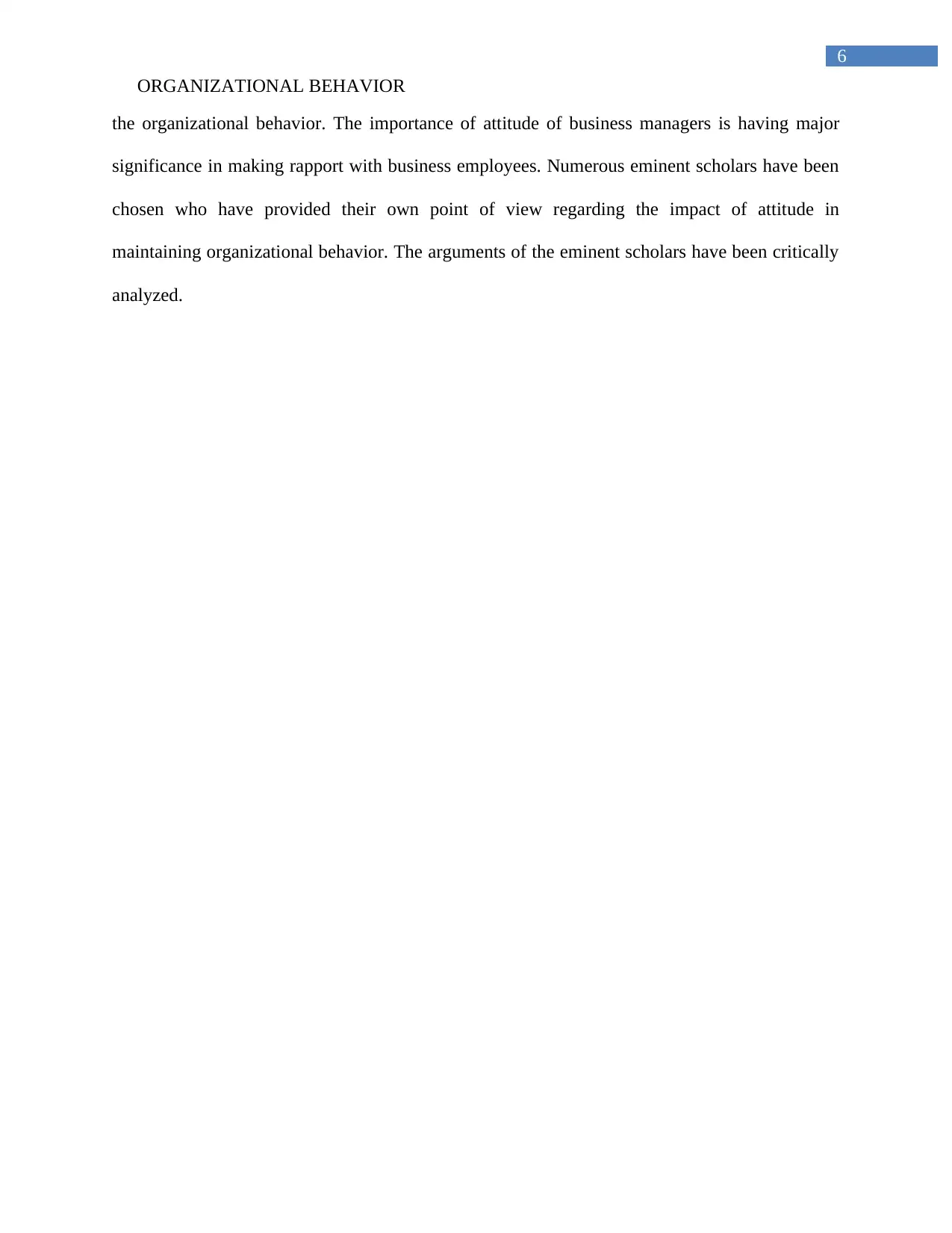
6
ORGANIZATIONAL BEHAVIOR
the organizational behavior. The importance of attitude of business managers is having major
significance in making rapport with business employees. Numerous eminent scholars have been
chosen who have provided their own point of view regarding the impact of attitude in
maintaining organizational behavior. The arguments of the eminent scholars have been critically
analyzed.
ORGANIZATIONAL BEHAVIOR
the organizational behavior. The importance of attitude of business managers is having major
significance in making rapport with business employees. Numerous eminent scholars have been
chosen who have provided their own point of view regarding the impact of attitude in
maintaining organizational behavior. The arguments of the eminent scholars have been critically
analyzed.
Paraphrase This Document
Need a fresh take? Get an instant paraphrase of this document with our AI Paraphraser
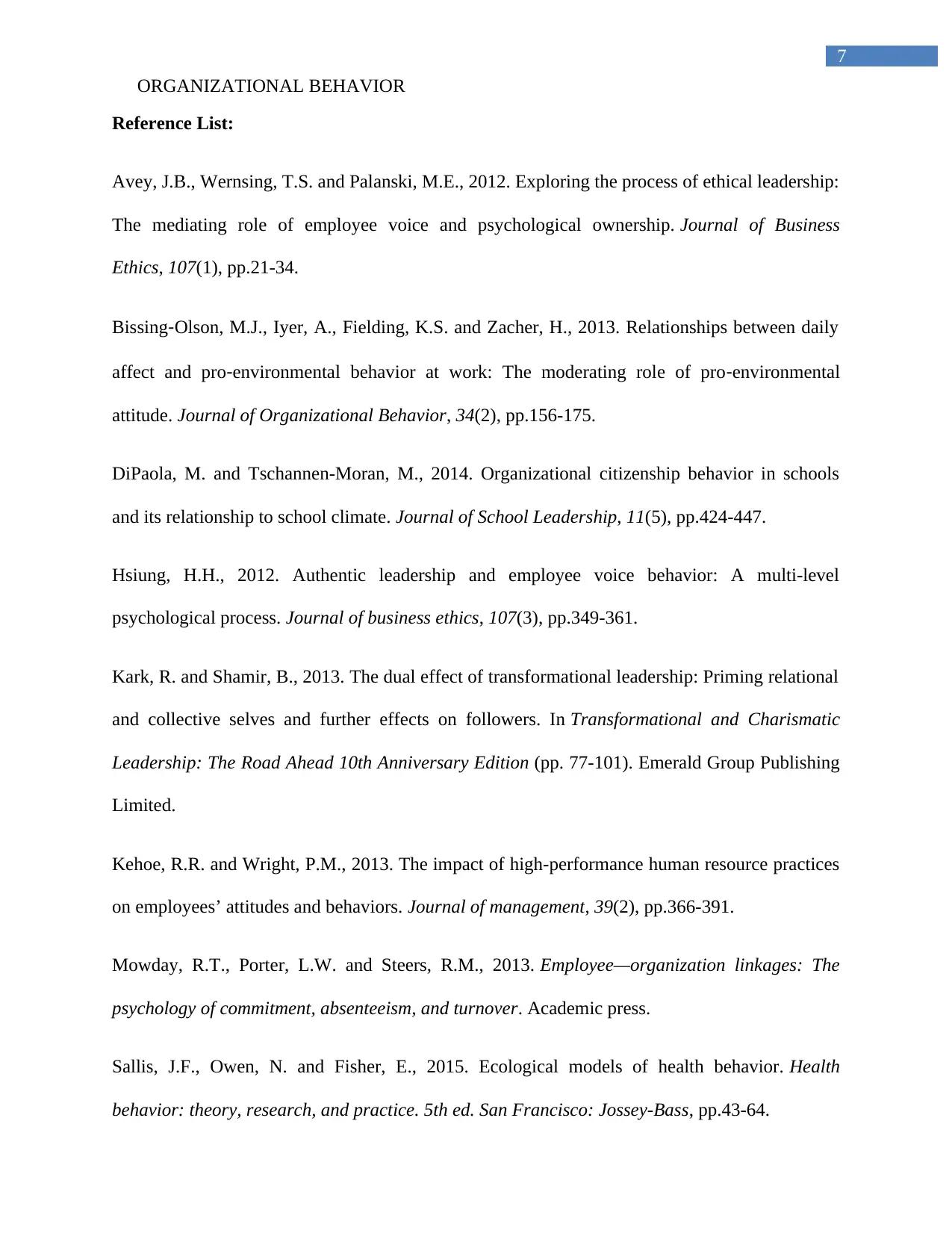
7
ORGANIZATIONAL BEHAVIOR
Reference List:
Avey, J.B., Wernsing, T.S. and Palanski, M.E., 2012. Exploring the process of ethical leadership:
The mediating role of employee voice and psychological ownership. Journal of Business
Ethics, 107(1), pp.21-34.
Bissing‐Olson, M.J., Iyer, A., Fielding, K.S. and Zacher, H., 2013. Relationships between daily
affect and pro‐environmental behavior at work: The moderating role of pro‐environmental
attitude. Journal of Organizational Behavior, 34(2), pp.156-175.
DiPaola, M. and Tschannen-Moran, M., 2014. Organizational citizenship behavior in schools
and its relationship to school climate. Journal of School Leadership, 11(5), pp.424-447.
Hsiung, H.H., 2012. Authentic leadership and employee voice behavior: A multi-level
psychological process. Journal of business ethics, 107(3), pp.349-361.
Kark, R. and Shamir, B., 2013. The dual effect of transformational leadership: Priming relational
and collective selves and further effects on followers. In Transformational and Charismatic
Leadership: The Road Ahead 10th Anniversary Edition (pp. 77-101). Emerald Group Publishing
Limited.
Kehoe, R.R. and Wright, P.M., 2013. The impact of high-performance human resource practices
on employees’ attitudes and behaviors. Journal of management, 39(2), pp.366-391.
Mowday, R.T., Porter, L.W. and Steers, R.M., 2013. Employee—organization linkages: The
psychology of commitment, absenteeism, and turnover. Academic press.
Sallis, J.F., Owen, N. and Fisher, E., 2015. Ecological models of health behavior. Health
behavior: theory, research, and practice. 5th ed. San Francisco: Jossey-Bass, pp.43-64.
ORGANIZATIONAL BEHAVIOR
Reference List:
Avey, J.B., Wernsing, T.S. and Palanski, M.E., 2012. Exploring the process of ethical leadership:
The mediating role of employee voice and psychological ownership. Journal of Business
Ethics, 107(1), pp.21-34.
Bissing‐Olson, M.J., Iyer, A., Fielding, K.S. and Zacher, H., 2013. Relationships between daily
affect and pro‐environmental behavior at work: The moderating role of pro‐environmental
attitude. Journal of Organizational Behavior, 34(2), pp.156-175.
DiPaola, M. and Tschannen-Moran, M., 2014. Organizational citizenship behavior in schools
and its relationship to school climate. Journal of School Leadership, 11(5), pp.424-447.
Hsiung, H.H., 2012. Authentic leadership and employee voice behavior: A multi-level
psychological process. Journal of business ethics, 107(3), pp.349-361.
Kark, R. and Shamir, B., 2013. The dual effect of transformational leadership: Priming relational
and collective selves and further effects on followers. In Transformational and Charismatic
Leadership: The Road Ahead 10th Anniversary Edition (pp. 77-101). Emerald Group Publishing
Limited.
Kehoe, R.R. and Wright, P.M., 2013. The impact of high-performance human resource practices
on employees’ attitudes and behaviors. Journal of management, 39(2), pp.366-391.
Mowday, R.T., Porter, L.W. and Steers, R.M., 2013. Employee—organization linkages: The
psychology of commitment, absenteeism, and turnover. Academic press.
Sallis, J.F., Owen, N. and Fisher, E., 2015. Ecological models of health behavior. Health
behavior: theory, research, and practice. 5th ed. San Francisco: Jossey-Bass, pp.43-64.
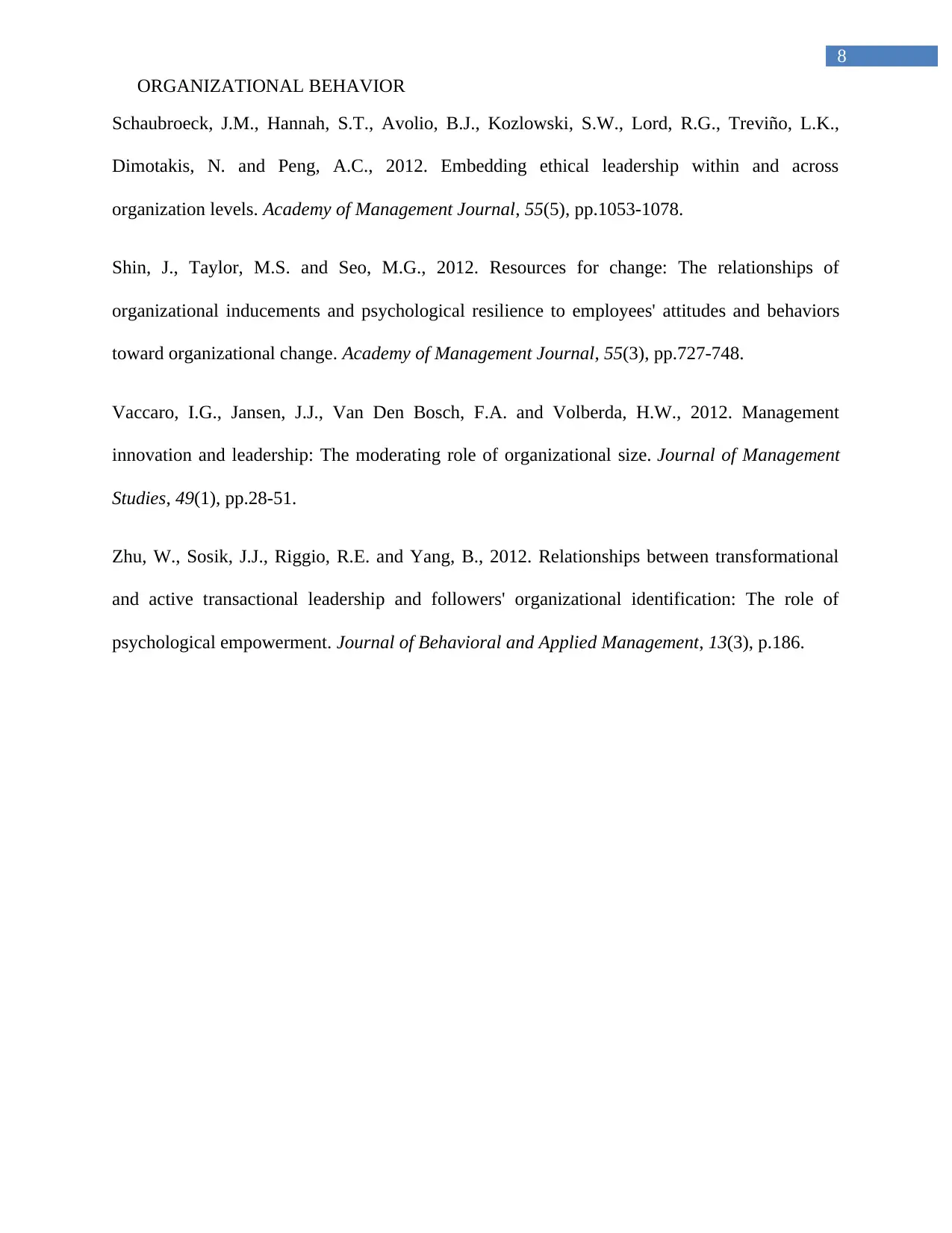
8
ORGANIZATIONAL BEHAVIOR
Schaubroeck, J.M., Hannah, S.T., Avolio, B.J., Kozlowski, S.W., Lord, R.G., Treviño, L.K.,
Dimotakis, N. and Peng, A.C., 2012. Embedding ethical leadership within and across
organization levels. Academy of Management Journal, 55(5), pp.1053-1078.
Shin, J., Taylor, M.S. and Seo, M.G., 2012. Resources for change: The relationships of
organizational inducements and psychological resilience to employees' attitudes and behaviors
toward organizational change. Academy of Management Journal, 55(3), pp.727-748.
Vaccaro, I.G., Jansen, J.J., Van Den Bosch, F.A. and Volberda, H.W., 2012. Management
innovation and leadership: The moderating role of organizational size. Journal of Management
Studies, 49(1), pp.28-51.
Zhu, W., Sosik, J.J., Riggio, R.E. and Yang, B., 2012. Relationships between transformational
and active transactional leadership and followers' organizational identification: The role of
psychological empowerment. Journal of Behavioral and Applied Management, 13(3), p.186.
ORGANIZATIONAL BEHAVIOR
Schaubroeck, J.M., Hannah, S.T., Avolio, B.J., Kozlowski, S.W., Lord, R.G., Treviño, L.K.,
Dimotakis, N. and Peng, A.C., 2012. Embedding ethical leadership within and across
organization levels. Academy of Management Journal, 55(5), pp.1053-1078.
Shin, J., Taylor, M.S. and Seo, M.G., 2012. Resources for change: The relationships of
organizational inducements and psychological resilience to employees' attitudes and behaviors
toward organizational change. Academy of Management Journal, 55(3), pp.727-748.
Vaccaro, I.G., Jansen, J.J., Van Den Bosch, F.A. and Volberda, H.W., 2012. Management
innovation and leadership: The moderating role of organizational size. Journal of Management
Studies, 49(1), pp.28-51.
Zhu, W., Sosik, J.J., Riggio, R.E. and Yang, B., 2012. Relationships between transformational
and active transactional leadership and followers' organizational identification: The role of
psychological empowerment. Journal of Behavioral and Applied Management, 13(3), p.186.
⊘ This is a preview!⊘
Do you want full access?
Subscribe today to unlock all pages.

Trusted by 1+ million students worldwide
1 out of 9
Related Documents
Your All-in-One AI-Powered Toolkit for Academic Success.
+13062052269
info@desklib.com
Available 24*7 on WhatsApp / Email
![[object Object]](/_next/static/media/star-bottom.7253800d.svg)
Unlock your academic potential
Copyright © 2020–2026 A2Z Services. All Rights Reserved. Developed and managed by ZUCOL.





